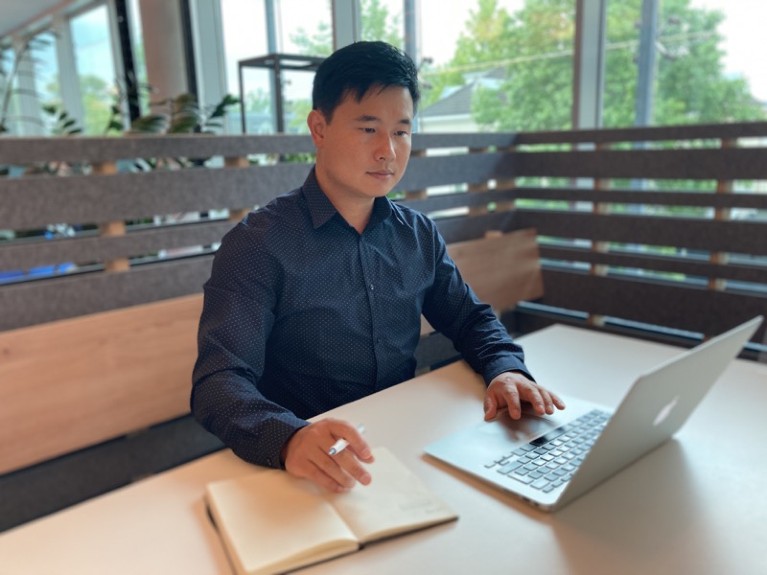
Credit: Shuman Wang
Seven months after launching a company to sell low-cost, silicon-based infrared sensors, engineer Tao Chen realized that he couldn’t make the technology work. He reflects on what he learnt, and how even a failed business can be a good career experience.
Why did you decide to launch your own business?
In August 2020, I was heading towards the end of a four-year postdoctoral contract with the NanoElectronics group at the University of Twente (UT) in Enschede, the Netherlands, and was faced with a big decision: would I look for another academic position or start a university spin-off business?
As a scientist, I’d become increasingly interested in moving out of academia. I found the atmosphere too competitive. Scientists are under huge pressure to publish large amounts of work and move up the career ladder. I wanted to see whether another path would allow me to work in my field and enjoy science without that stress.
In 2018, the university’s technology-transfer office had helped me to begin the process of patenting a sensor that I’d been working on in the laboratory, and was offering further support to start a business, such as help with applying for grants.
After years of moving around, I was keen to stay in Enschede, where I was settled with my family. I’m originally from a small city called Qianjiang in Hubei province, central China. I moved to Wuhan, the region’s capital city, for my engineering degree, then to Beijing for my master’s, and completed my PhD at Edinburgh University — where I met my wife, who is also Chinese. We now have two children.
Despite my engineering and international experience, I knew that starting a business was very risky, and I lacked the relevant expertise and professional network to help get the venture off the ground.
How did you make the leap?
In February 2020, I made two applications for start-up funding that would enable me to launch a company. By June, I had received 40,000 (US$47,780) from the Dutch Research Council and two tranches of 25,000 from the Netherlands Enterprise Agency. By 8 September 2020, I was ready to launch CTorrent.
Four people were involved, including myself. The others were a business-development adviser from UT, my academic supervisor and the chief executive of a local company, who would probably have run the business if it had taken off, leaving me to focus on R&D.
I stayed in my previous office at UT and shared the university’s office space and lab facilities.
Collection: The business of science
My main job was to build a prototype of my idea to test its feasibility. Until that point, I’d been able to do only preliminary research on how to make an infrared sensor from silicon that would be as sensitive as current sensors, but much cheaper to manufacture.
My initial research came out of a wider project to develop unconventional electrical circuits in silicon to perform artificial-intelligence operations. Those experiments showed how the resistance of silicon material that we’d developed in the lab changed with temperature. From the resulting data, I inferred that the material would be highly sensitive to heat.
My device worked by measuring how the electrical resistance of an ultrathin layer of silicon changes as its temperature changes when it absorbs infrared light.
If the prototype had been a success, we would have hoped to lower the price of a standard low-resolution thermal camera, which usually costs around 200, to less than 50.
Infrared sensors are used to measure radiated energy from a surface to detect heat and motion. During the coronavirus pandemic, for example, infrared thermal-imaging cameras have frequently been used in public places to check people’s body temperatures, to prevent the spread of infection.
What happened?
When I started the business, I knew that my main obstacle would be mitigating the electrical noise produced by a silicon-based device; this noise would prevent the sensor from picking up the signals that it’s designed to measure.
In December 2020, we noticed that a large French research institution, CEA-Leti, had joined forces with Lynred, a maker of infrared detectors, to develop technology similar to mine. That made me optimistic about our prospects: although it might have meant a competitor down the line, it showed that other people, too, had some confidence that the technology would be a success in the future.
But when our initial results came out in February 2021, they indicated that a great deal of effort would be required to improve my technology’s performance. The sensitivity of our devices was good, but the electrical noise was hundreds of times greater than the noise seen in existing technologies. We weren’t going to quickly overcome this problem.
I knew by then that the business would fail, and we closed shop in April 2021.
In retrospect, I think that we were just not ready technologically. We would have needed a lot more fundamental research before we started, to find whether there were ways to mitigate or reduce the noise.
How did your family support you through this?
I come from a family of entrepreneurs, so it wasn’t entirely unexpected that I would start a business. That said, they’ve all had their share of successes and setbacks.
In the early 1990s, for example, my uncle used knowledge that he’d gained in cryogenics while working for China’s air force to start manufacturing ice lollies. At first, the business boomed. But eventually sales dropped — and despite trying new ideas, he had to close the company.
Last time I visited China, in July 2019, I paid a visit to my ‘ice lolly’ uncle. For the first time, he told me he was wary of my choice to pursue a PhD. I was surprised by this because he hadn’t mentioned it before.
Often in China, family members project their own professional ambitions onto their children or close relatives. Also, in my hometown — maybe even across all of China — career success is often measured by the amount of money you make, or by your rank in a company or organization.
I explained to my uncle that scientists are not just after the money, and he understood.
My own parents were very encouraging when I told them I was going to start a business, but they actually warned me not to follow the money at the expense of my own personal and professional values. They have always been supportive of my decisions and have never shown any preference regarding my choices.
What are you doing now?
My family and I are still in the Netherlands, but we’re not involved in any serious business or research. My wife and I are both looking for jobs — in academia — but at a slow pace. It’s like a gap year for us.
In the mornings, I read scientific literature. And in the afternoons, I take the kids to various clubs, for activities such as judo, athletics, swimming, dancing and painting.
For now, I would like to fall back into academia. I have found that both business and academic work environments are stressful, but in different ways. When running a business, the pressure is ever-present. All of your actions are benchmarked against the company’s goal. The feedback you get is quick and tangible. In academia, the feedback is long-term. Until a journal’s reviewers accept your manuscript for publication, you can feel uncertain of the meaning and significance of what you have done.
Although there might be research-scientist positions in industry, I have not yet come across one that matches my expertise and interests.
I also continue to talk with friends about business ideas. A few months ago, I started an entrepreneur discussion group on the social media app WeChat, for me and other Chinese researchers living in China or abroad, and have organized 10 online discussions on investment, team building, intellectual property and so on. There are more than 100 group members now.
Are scientists becoming more entrepreneurial?
Among Chinese academics, conversations around the future always include the option to start a company. It’s a very popular subject. I think we’re inspired by how much our country has progressed because of technological innovation. In China, the government actively promotes entrepreneurship.
Such conversations are much less common among European researchers, in my experience. I remember only one Dutch student ever talking to me about a business idea.
Also, in Western countries, entrepreneurship doesn’t carry the same mystique and isn’t looked on quite as romantically. If you want to start a business, there are institutional mechanisms — technology-transfer offices, government schemes and easy access to business loans — to get you going.
Perhaps it’s just more of a personal journey for us.

 Part of Nature Outlook: The Spinoff Prize 2021
Part of Nature Outlook: The Spinoff Prize 2021
 ‘Can you work with less-qualified people?’ and 19 other curveball questions to navigate at industry interviews
‘Can you work with less-qualified people?’ and 19 other curveball questions to navigate at industry interviews
 Five ‘power skills’ for becoming a team leader
Five ‘power skills’ for becoming a team leader







